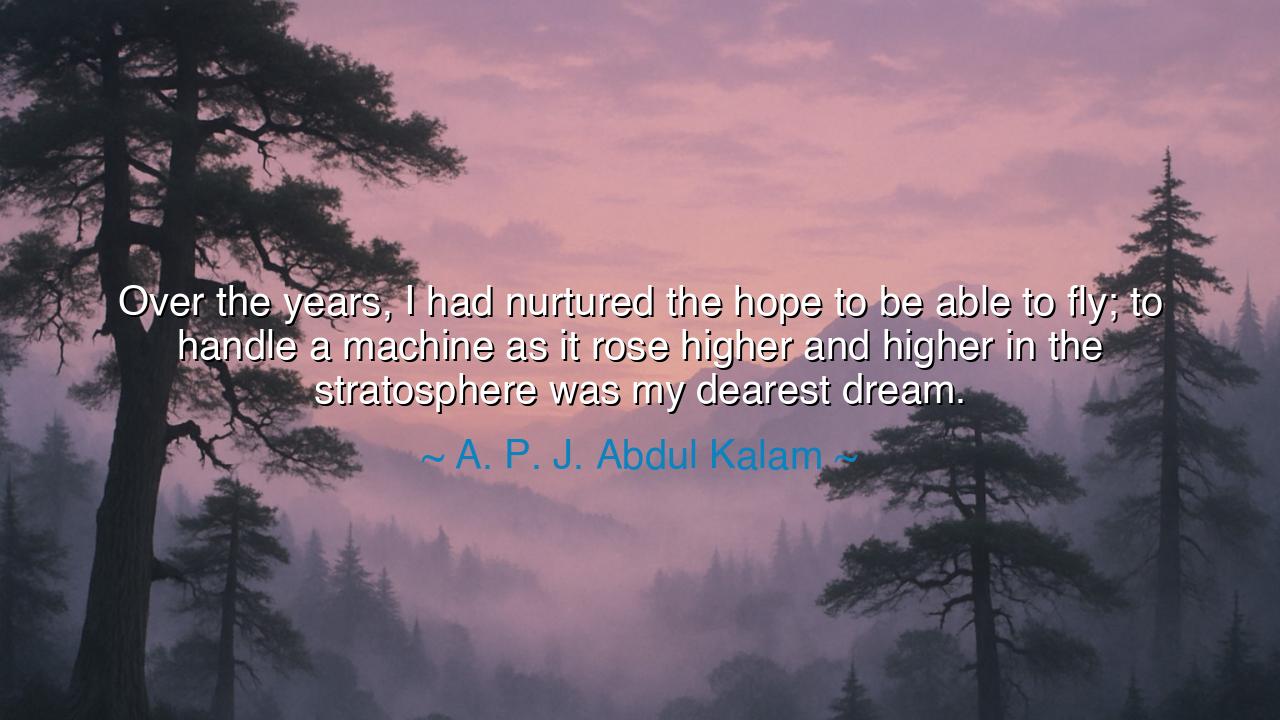
Over the years, I had nurtured the hope to be able to fly; to
Over the years, I had nurtured the hope to be able to fly; to handle a machine as it rose higher and higher in the stratosphere was my dearest dream.






When A. P. J. Abdul Kalam spoke the words, “Over the years, I had nurtured the hope to be able to fly; to handle a machine as it rose higher and higher in the stratosphere was my dearest dream,” he was not merely speaking of the sky—he was speaking of the soul. The dream to fly is the oldest yearning of humankind, as ancient as the first gaze toward the birds who touched the heavens while man’s feet were bound to earth. In Kalam’s voice, this longing became sacred: not just the wish to conquer height, but the quest to rise above limits, to turn hope into flight, and vision into destiny. For him, to fly was not simply to command a machine—it was to master himself, to rise through discipline, humility, and the undying fire of dreams.
This dream was born in the heart of a young boy from Rameswaram, a small town by the sea. The son of a humble boatman, Kalam grew up surrounded by simplicity, yet his mind was filled with vastness. While others saw the waves and the wind, he saw possibility—the sky calling to him like a divine challenge. He would watch birds and planes with wonder, and in his soul grew a quiet promise: that one day, he too would touch the stratosphere, that thin edge between earth and infinity. His dream was not born from privilege, but from hope nurtured through faith, perseverance, and labor. It was the fire of that dream that carried him from the shores of Rameswaram to the laboratories of India’s space and defense programs, where he would one day make his nation itself soar.
In this quote lies the universal truth of all great journeys—that hope must be nurtured. It is not enough to wish; one must tend the dream like a sacred flame, feeding it with learning, patience, and unyielding will. For years, Kalam studied, failed, rose again, and studied more. His dream to “handle a machine as it rose higher and higher” became both literal and symbolic. He became the engineer who lifted rockets toward the heavens, and also the teacher who lifted countless minds toward enlightenment. His flight was of steel and fire, yes—but also of spirit and vision. The dream of flight had become the dream of upliftment—for a nation, for a people, for humanity itself.
Throughout history, the dream of flight has mirrored the human condition. Leonardo da Vinci, centuries before Kalam, filled his notebooks with sketches of wings and machines. He never flew, but his vision lit a path for others. The Wright Brothers, born in an age when flight was a fantasy, turned that fantasy into reality through relentless effort and faith. Kalam stood in their lineage—a dreamer of the impossible, who turned imagination into innovation. His dream was not selfish; it was service—to lift India, to make her reach the skies, not through conquest, but through knowledge, unity, and courage.
In Kalam’s words, the stratosphere is more than a layer of air—it is a symbol of transcendence. To rise “higher and higher” is to move beyond the gravity of doubt, fear, and smallness. It is to live a life driven by purpose, not by circumstance. Many dream, but few nurture their dreams with devotion. Most let them die in the shadow of comfort or failure. But Kalam’s message is that to dream is divine, and to work for that dream is the highest form of worship. In the temple of the sky, effort is prayer, and perseverance is faith.
For those who walk the earth today, this teaching still burns bright. Each of us carries within a longing to fly—to build, to create, to overcome. Yet the wings of success grow only from hope joined with will. Do not envy those who have reached the heights; study the patience of their ascent. Like Kalam, start where you are, use what you have, and give all that you are. Let your failures be teachers, not tombstones. Let your hope be the wind beneath your wings, and your labor the craft that lifts you.
And so, children of tomorrow, remember this: to fly is not only to rise through the air, but to rise through life. Every act of courage, every dream nurtured through hardship, is a form of flight. Do not fear the sky—it was made for you. Let your hope be boundless, your will unbroken, your purpose pure. And when you soar, as Kalam did, remember those still earthbound, and help them rise. For the greatest flight is not the ascent of one soul, but the uplifting of all mankind toward the infinite blue of dreams fulfilled.






AAdministratorAdministrator
Welcome, honored guests. Please leave a comment, we will respond soon